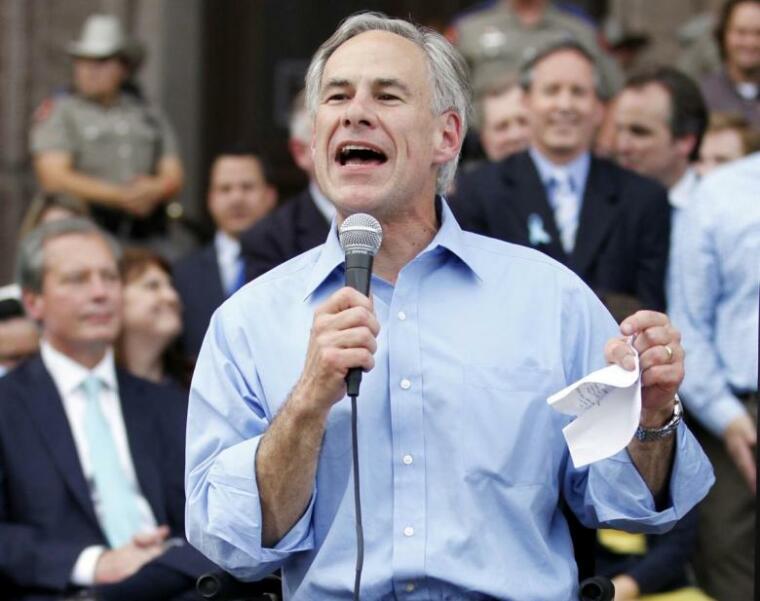Texas governor urges lawmakers to block state funding for Planned Parenthood

Texas Gov. Greg Abbott has reportedly asked lawmakers to consider his proposal to defund Planned Parenthood and other abortion groups.
According to NPR Austin, Texas legislators have been urged to consider Abbott's proposal to block all taxpayer funds from being sent to abortion providers in the upcoming special legislative session.
While federal and state policies prohibit the use of taxpayer money for abortions, pro-life activists have argued that these measures are not adequate.
Joe Pojman, executive director of Texas Alliance for Life, noted that cities and counties in the state are still allowed to make contracts with abortion groups using taxpayer dollars.
"It is possible under current law for certain cities or counties to make contracts with abortion providers – even for abortions themselves – and for affiliates of abortion providers," he said. "And we think that's essentially funding the abortion industry," he continued.
As an example, Pojman pointed to the city of Austin, which currently has a contract with Planned Parenthood to teach sex education and STD prevention.
He said he takes issue with taxpayer money going to Planned Parenthood in general even though the contracts were for services other than abortions.
"That means the taxpayers of Austin or anyone who comes to Austin and purchases any kind of item and pays sales tax is essentially funding Planned Parenthood, which is the largest provider of abortions in Texas," he said.
Texas has been stepping up its efforts to strip taxpayer funding from Planned Parenthood. On June 28, Abbott sent a waiver to the Centers for Medicare and Medicaid Services, asking the agency to approve federal funding for a state-administered family planning program that excludes abortion providers from participation.
John Seago, the legislative director for Texas Right to Life, believes that the request could set off a chain reaction of copycat programs in other Republican-leaning states across the nation if it is approved by the Trump administration.
"Republicans do want a strong network for women's health services, and the prospect that you can do that while protecting life is something that I think a lot of states would jump on board with," he said, according to The Washington Times.
In 2007, Texas launched the Women's Health Program, now called Healthy Texas Women, which was intended to reduce Medicaid costs. The program allocated funds to clinics that provide contraception, STI testing, cancer screenings and other health care services to low-income women. Abortion clinics were supposed to be prohibited from participating in the program, but the Texas Health and Human Services did not try to enforce the ban against Planned Parenthood until 2011.
When the state sought to enforce the ban, Planned Parenthood sued, arguing that the rules by the Centers for Medicare and Medicaid Services prohibit the state from excluding clinics just because they perform abortions. However, the ban was upheld in a 2012 ruling by the Fifth U.S. Court of Appeals.
The program was initially a joint state-federal venture, but the Obama administration declined to pick it up when it came up for renewal. Texas continued to fund the Women's Health Program with state dollars in the ensuing years, and the state is now petitioning the President Donald Trump's administration for federal funding that could amount to $35 million per year.
 Christians don't have to affirm transgenderism, but they can’t express that view at work: tribunal
Christians don't have to affirm transgenderism, but they can’t express that view at work: tribunal Archaeology discovery: Medieval Christian prayer beads found on Holy Island
Archaeology discovery: Medieval Christian prayer beads found on Holy Island Presbyterian Church in America votes to leave National Association of Evangelicals
Presbyterian Church in America votes to leave National Association of Evangelicals Over 50 killed in 'vile and satanic' attack at Nigerian church on Pentecost Sunday
Over 50 killed in 'vile and satanic' attack at Nigerian church on Pentecost Sunday Ukrainian Orthodox Church severs ties with Moscow over Patriarch Kirill's support for Putin's war
Ukrainian Orthodox Church severs ties with Moscow over Patriarch Kirill's support for Putin's war Islamic State kills 20 Nigerian Christians as revenge for US airstrike
Islamic State kills 20 Nigerian Christians as revenge for US airstrike Man who served 33 years in prison for murder leads inmates to Christ
Man who served 33 years in prison for murder leads inmates to Christ


 Nigerian student beaten to death, body burned over ‘blasphemous’ WhatsApp message
Nigerian student beaten to death, body burned over ‘blasphemous’ WhatsApp message 'A new low': World reacts after Hong Kong arrests 90-year-old Cardinal Joseph Zen
'A new low': World reacts after Hong Kong arrests 90-year-old Cardinal Joseph Zen Iran sentences Christian man to 10 years in prison for hosting house church worship gathering
Iran sentences Christian man to 10 years in prison for hosting house church worship gathering French Guyana: Pastor shot dead, church set on fire after meeting delegation of Evangelicals
French Guyana: Pastor shot dead, church set on fire after meeting delegation of Evangelicals ‘Talking Jesus’ report finds only 6% of UK adults identify as practicing Christians
‘Talking Jesus’ report finds only 6% of UK adults identify as practicing Christians Mission Eurasia ministry center blown up in Ukraine, hundreds of Bibles destroyed: 'God will provide'
Mission Eurasia ministry center blown up in Ukraine, hundreds of Bibles destroyed: 'God will provide' Church holds service for first time after ISIS desecrated it 8 years ago
Church holds service for first time after ISIS desecrated it 8 years ago Burger King apologizes for 'offensive campaign' using Jesus' words at the Last Supper
Burger King apologizes for 'offensive campaign' using Jesus' words at the Last Supper Uganda: Muslims abduct teacher, burn him inside mosque for praying in Christ’s name
Uganda: Muslims abduct teacher, burn him inside mosque for praying in Christ’s name